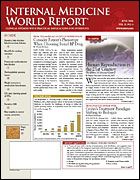Publication
Article
Internal Medicine World Report
Measuring Procalcitonin Levels Can Reduce Need for Antibiotics in CAP
Measuring Procalcitonin Levels Can Reduce Need
for Antibiotics in CAP
SAN DIEGO—Measuring a hormone level in the blood can help physicians reduce the number of days patients with pneumonia have to take antibiotics to cure their infection, according to data presented at the American Thoracic Society International Conference. This prospective, single-blind, randomized study of 200 patients with community- acquired pneumonia (CAP) was conducted to determine the potential benefits of procalcitonin as a tool to guide
antibiotic use. The patients were divided into 2 groups—one group (n = 101) that
received standard antibiotics as recommended and a second group (n = 99)
whose levels of procalcitonin were measured with the Kryptor PCT assay at days
4, 6, and 8, and in whom antibiotics were discontinued if levels were <0.25 ìg/L. A
standardized workup of all patients was performed at baseline and after 6 weeks.
In the study, patients whose levels of procalcitonin were measured during the
course of their illness took antibiotics an average of 6 days, compared with an average
of 12 days for patients whose levels of procalcitonin were not measured. A total
of 15% of patients whose hormone levels were measured did not have to takeantibiotics at all.
“Because of concerns about antibiotic resistance, as well as the cost of antibiotics,
it’s always better to give fewer antibiotics,” said coinvestigator Michael Tamm, MD, chief of pulmonary medicine and pulmonary cell research, University Hospital, Basel, Switzerland.
Many cases of CAP are caused by bacteria and require treatment with antibiotics,
but some cases are viral and do not need antibiotics. However, physicians typically
do not like to delay treatment to wait for laboratory results to tell whether
a patient’s pneumonia is bacterial or viral. “Once the treatment is started, it is usually
continued for 10 to 14 days, because nobody knows when you can stop without
a risk for the patient,” Dr Tamm said. Results of the blood test that measures
procalcitonin levels can be obtained in only 1 hour. Patients whose procalcitonin levels
were measured and who were started on antibiotics were able to stop the therapy
after an average of 6 days; their course of illness was similar to that of patients who
received a full course of antibiotics in terms of recovery and number of days
spent in the hospital. “We showed how we were able to cut the number of days patients were taking antibiotics in half, without compromising their outcome,” Dr Tamm said.
